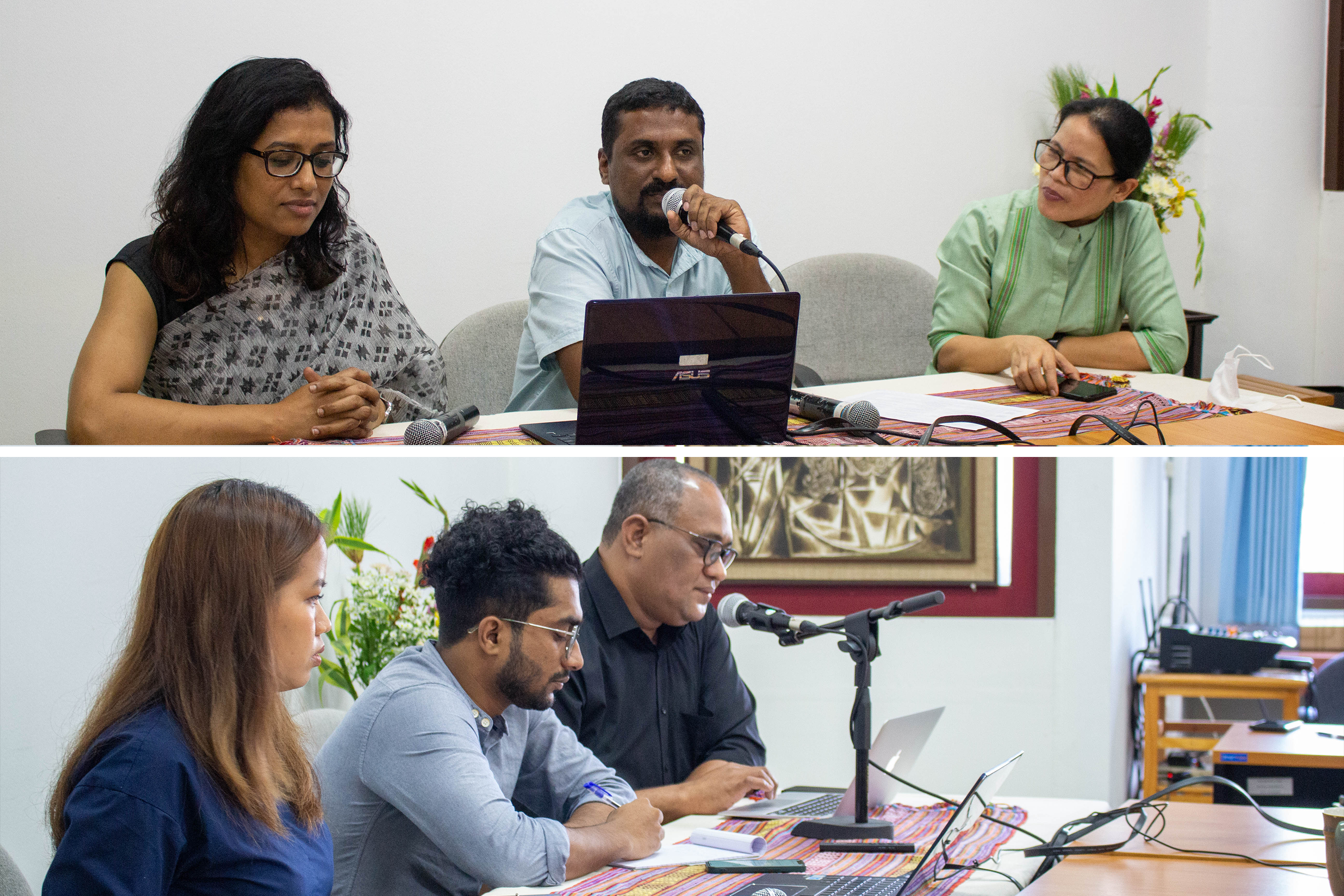
Panel sessions at the CCA’s Asia Regional Consultation on ‘Ecumenical Diakonia, Church’s Response to Sustainable Development Goals (SDGs) in Asia’ Chiang Mai: Several pathways for the integration of the United Nations Sustainable Development Goals (SDGs) into the Diaconal mission of Asian churches emerged on the second day of the Asia Regional Consultation on ‘Ecumenical Diakonia, Church’s Response to Sustainable Development Goals (SDGs) in Asia’. Representatives of church and ecumenical organisations shared various expressions of ecumenical Diakonia in their respective contexts. Models, policies, and best practices relating to the utilisation or instrumentalisation of the SDG framework in Diakonia were shared from Indonesia, the Philippines, Taiwan, Bangladesh, and India. Organised by the Christian Conference of Asia (CCA) in collaboration with the World Council of Churches (WCC), the consultation is underway at CCA headquarters in Chiang Mai, Thailand. Rev. Henrek Lokra of the Communion of Churches in Indonesia (PGI) described the Diaconal activities of Indonesia’s churches across the country. In response to socio-political-economic issues in Indonesia, he explained that PGI’s ecumenical Diakonia focused on social justice, capacity building for disaster management and climate mitigation responses, religious harmony, and paralegal training. Patricia Mungcal of the National Council of Churches in the Philippines (NCCP) elaborated on the collective life and witness of the churches and their associates, as well as on concrete expressions of diaconal ministry, all with components of education, advocacy, and service, with a strong emphasis on placing people at the centre of the work, “for they are the ones we pledged to serve”. Mungcal stated that the NCCP collaborated with grassroots organisations, rights organisations, and national civil society organisations on issues such as online sexual abuse and exploitation of children (OSAEC), gender-based violence, HIV and AIDS, indigenous peoples, and human rights. Rev. Mahn Palmerston, General Secretary of the Myanmar Council of Churches (MCC), spoke about how the churches and members expressed ecumenical Diakonia, particularly during the COVID-19 crisis. Aside from providing relief assistance to COVID-19 patients, volunteers from MCC member churches cared for patients who had passed away due to virus infection. Sungwon Jo of the Presbyterian Church of Korea’s (PCK) Diakonia department shared concrete expressions of ecumenical Diakonia missions carried out through PCK in addressing issues such as human rights, social justice, peace, women’s rights, mental health, environmental preservation, and refugees from war-torn countries. He also spoke about PCK’s emergency response, relief, and rehabilitation efforts, as well as its solidarity and advocacy work in situations that arose in Myanmar, the Philippines, Afghanistan, and Ukraine. Cooperation, according to Sungwon Jo, was key to pursuing genuine ecumenical Diakonia work with partner churches and local churches in Korea and around the world. Rev. Huang Hsin-Lien, pastor of the Presbyterian Church in Taiwan described Diaconal work which involved congregations and local churches across the country. Prayers for ‘Solidarity with Ukraine’, the construction of bamboo houses in Nepal for underprivileged families, the Thai Labor Mission Centre, a project for Thai migrant workers in Taiwan, a centre assisting seafarers and fisherfolk, and fundraising for poor communities in Zambia that could not afford to purchase masks were among the initiatives they have carried out. Rev. Rii Tajimaraw, PCT’s Indigenous programme secretary, also described the church’s ministry to indigenous peoples. The session on ‘People’s Participation in Achieving SDGs: Ecumenical Responses’ saw presentations from Rev. Moncy Varghese and Juliate Malakar. Rev. Moncy Varghese, the Director of the Christian Agency for Rural Development (CARD), of the Malankara Mar Thoma Syrian Church in India, said, some of the initiatives that the CARD has undertaken since its inception include CARD-Care, food security and agricultural development, gender equality and women’s empowerment, HIV and AIDS prevention, water conservation, biodiversity protection, climate change and disaster management, livelihood support, rural products promotion, and COVID-19 mitigation. Juliate Malakar, the Executive Director of the Christian Commission for Development in Bangladesh (CCDB), shared a number of programmes under the CCDB’s mandate of “working on the basis of ecumenical principles, to create a society where the poor, marginalised, and vulnerable people in Bangladesh can claim and enjoy their rights, and seek justice for a sustainable livelihood”. The CCDB, said Ms Malakar, was a pioneer in poverty reduction and livelihood development through its flagship PMSC approach (formation and strengthening of people’s institutions), where 90 percent of the workers and beneficiaries were women. Recently, the CCDB also inaugurated its Community Climate Resilience Centre (CCRC) to educate and empower communities for climate resilience. Rev. Benjamin Inbaraj and Alwynn Javier shared their insights in the session on ‘Towards an Effective Ecumenical Diakonia Ministry in Asia: Coherence and Coordination’. Rev. Benjamin Inbaraj, Director of the Church of South India’s ‘Social Empowerment: Vision in Action’ (SEVA), stated that the church’s commitment was to “make congregations in every nook and corner of South India into Diaconal communities”. He shared that during the COVID-19 lockdowns, the Diakonal nature of the church “shone brightly, through the life-sustaining mission of every congregation, through feeding the hungry, sheltering migrants, providing medical aid, visiting patients, and facilitating burials”. Mr Alwynn Javier, the ACT Alliance Regional Representative for Asia and the Pacific, provided an overview of ACT Alliance programmes and new additional focus areas and issues, as well as its different regional and national fora. The day’s sessions and discussions focused on cooperation and partnership that played significant roles in the pursuit of Diaconal service in various communities and societies. The participants noted the emerging challenges of continuing wider Diaconal mission work in their Asian contexts, in the face of the shrinking of civil spaces and the drying up or diversion of funds. They emphasised the necessity of greater coherence among churches and church-based diaconal ministries to ensure that the ultimate purpose of serving those people and communities that were suffering the most was fulfilled. The consultation has brought together 35 representatives of member churches and ecumenical organisations from across Asia. SOURCE>CCA |